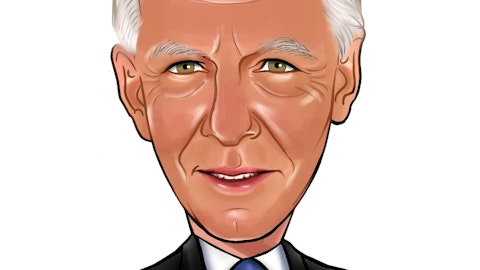Yaron Kinar: 76 okay, okay well got it. So, where I guess that so leaves this quarter has been weaker than the previous quarters of the year? Where did the deterioration come from the 76% versus I think 66% last quarter?
Stewart Ellis: I think the last quarter would also have included favorable development, we’ve had favorable development in each of the quarter’s this year, if you adjust for the favorable development in prior quarters, I do think it is a meaningful improvement, especially year-over-year, it’s a substantial improvement as each of our quarter’s have been in 2021 versus 2021, excuse me.
Yaron Kinar: Okay. Then the decision to write-off goodwill, can you maybe talk a little bit about that and then what drove that?
Stewart Ellis: Yes, so happy to take that one. I think, as part of our compliance with GAAP, we generally do routine testing of goodwill. And we – generally perform that test in the second half of the year. We’ve seen as I know, everyone has been seeing in the market, very significant depressions in valuations. And if you look at our stock, in particular, over the past few quarters, it’s trading below our cash balance. And so that was an indication that we should assess the goodwill and we looked at a number of factors, but that was a fairly important one and overall concluded that given that that the market value of the company is trading below our cash balance, it’s hard to justify not taking some action to write it down.
Yaron Kinar: Understood and maybe one final one on my end. I think at the Investor Day, you had talked about the Book a Pro app, and at the time, you’d left it open the economics of it open a little bit. Can you maybe talk through how you’re thinking about getting remunerated for that business?
Richard McCathron: Yes, I think it’s important. I think it’s important to recognize sort of our philosophical thoughts, in Hippo related to a product market fit. We generally when we launch a program or we’re contemplating launching a program, it’s very important for us to optimize for the customer, what they deem important, do testing on what they feel that that would – what they would be willing to pay for any type of product. What we want to avoid when we launch something that is so new, like this feature that from our perspective doesn’t really exist, the idea of what value we can bring to that customer. And we don’t want to create a false positive or a false negative related to how we’re going to monetize that. So we have different mechanisms in which we’re testing to determine the best way to monetize our total home protection services.
But that’s something from our perspective that comes later, once we know exactly what the customer wants, that we’re fulfilling those needs, and that we’ve met the promise of helping them protect the joy of homeownership.
Yaron Kinar: Thank you.
Richard McCathron: Yaron by the way, that’s one of the reasons why on Investor Day, we did not put a meaningful number related to how we’re going to monetize that over time. We think that that’s upside.
Yaron Kinar: Got it. Thank you.
Operator: Thank you. Our next question comes from the line of Michael Phillips with Morgan Stanley. Your line is now open.
Michael Phillips: Thanks, good evening everybody. How do you respond to the idea that maybe taking such amounts of favorable development on property lines, there’s lots of inflation is a risky bet right now?

